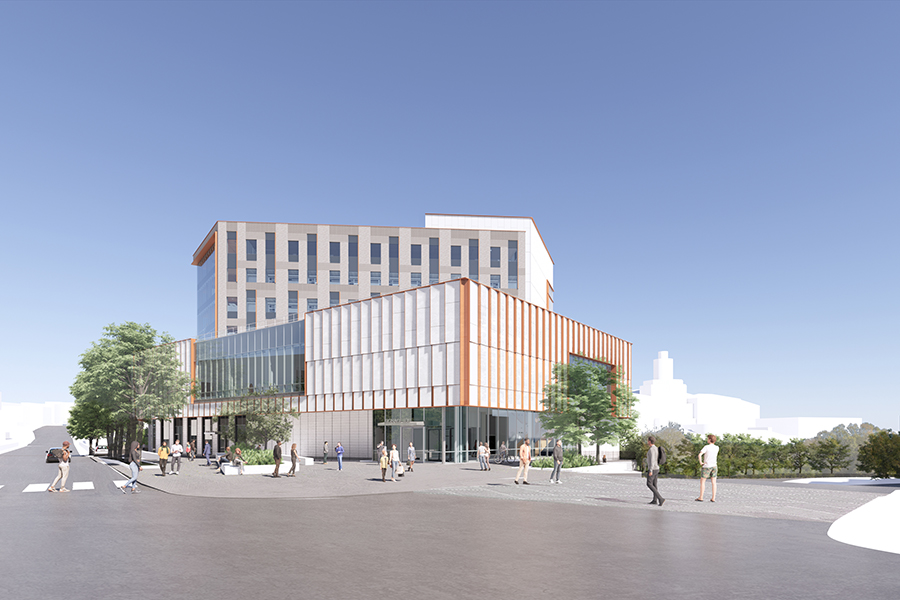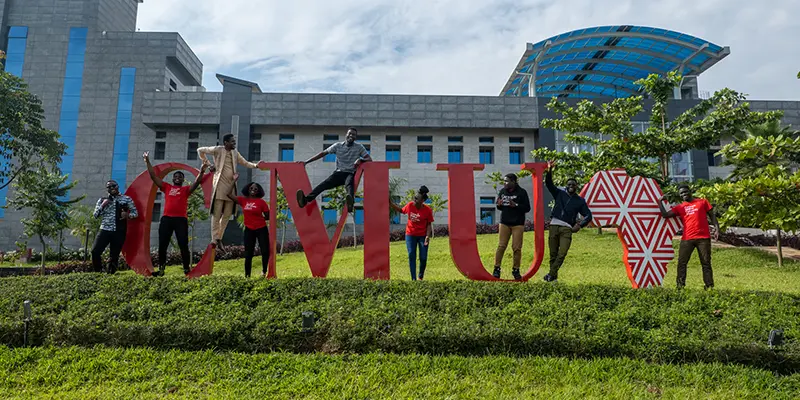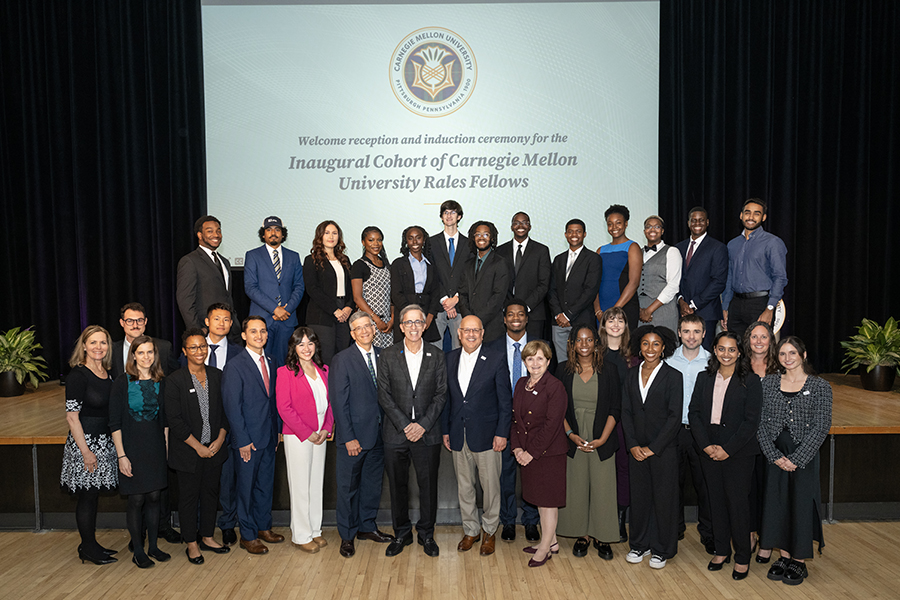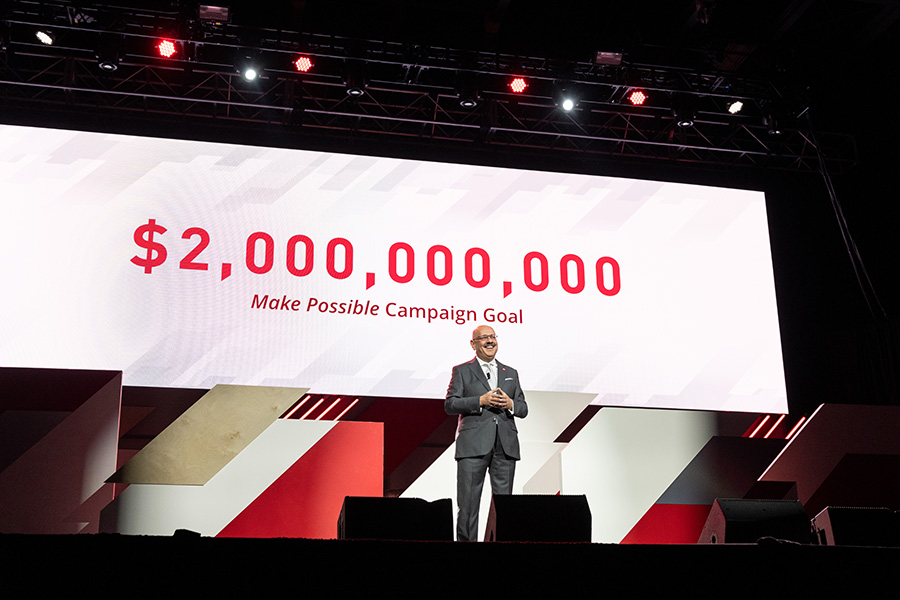History Of Make Possible: The Campaign for Carnegie Mellon University
Along with support and resources for each of CMU’s colleges and schools, Make Possible: The Campaign for Carnegie Mellon University was designed to accelerate significant initiatives in four key areas to advance the university’s education and research mission: accelerating technological advancements to benefit humanity; fueling artistic expression and creative inquiry to shape modern culture; achieving breakthroughs in discovery by transforming how scientific inquiry is pursued; and fostering a dynamic experience that enables CMU students to thrive.
The campaign built on the university’s momentum to advance work that addresses the most pressing issues of the modern era, from sustainability, energy, transportation and health care to data security, privacy and the ethical development of automation and artificial intelligence. CMU’s unique collaborative and cross-disciplinary culture has made it possible for scientists and business experts, artists and policy makers, humanists and engineers to tackle problems of great societal importance and create solutions with real-world impact.
In the years since its public launch, supporters have shown overwhelming enthusiasm for the work happening at Carnegie Mellon and incredible investment in ensuring the university maintains its impact far into the future.
“Carnegie Mellon was founded by an extraordinary act of philanthropy, and that spirit of giving is only stronger today as evidenced by supporters of our Make Possible campaign,” said President Farnam Jahanian.
More than 72,000 supporters have contributed over $2.5 billion to the university for endowed professorships, deanships and headships, and endowed scholarships and fellowships as well as capital projects like the Richard King Mellon Hall of Sciences, TCS Hall, Tepper Quad, Highmark Center for Health, Wellness and Athletics, the Robotics Innovation Center, and the new Scaife Hall (and many others).
October 2018
On Oct. 30, Carnegie Mellon University publicly announced a $2 billion comprehensive campaign — the largest in its history — to accelerate the institution’s leadership at the critical intersection of technology and humanity.
“Make Possible is our community’s philanthropic investment to advance our education and research mission, empower our students, faculty and staff, and benefit the lives of people across the planet,” said President Farnam Jahanian.
During the quiet phase leading up to the announcement, more than 42,000 generous supporters contributed more than half of the campaign’s $2 billion goal, fueling collaborative research across disciplines and supporting education and innovation.
May 2021
 Carnegie Mellon University and the Richard King Mellon Foundation announce that the two long-time partners will together make a transformational investment in science and technology leadership at the university; in a more vibrant future for the Hazelwood neighborhood; and in Pittsburgh’s ongoing economic renaissance.
Carnegie Mellon University and the Richard King Mellon Foundation announce that the two long-time partners will together make a transformational investment in science and technology leadership at the university; in a more vibrant future for the Hazelwood neighborhood; and in Pittsburgh’s ongoing economic renaissance.
The Foundation has approved a $150 million grant to CMU — the largest single grant in the Foundation’s 74-year history. The first $75 million is the lead gift for a new cutting-edge science building on the CMU campus in the Oakland neighborhood of Pittsburgh. The second $75 million will seed a new robotics innovation center and an institute focused on advanced materials and manufacturing at Hazelwood Green — a former riverside steel mill site that will attract the jobs and industries of the new economy, while enabling development of a true mixed-use destination that will be a positive and inclusive part of Hazelwood.
“This historic investment will help Pittsburgh to control its economic destiny and to reassert its rightful place as the national leader in the most important industries of today and tomorrow, with access to everyone who wants to be part of the story,” said Sam Reiman, director of the Richard King Mellon Foundation.
September 2022
 Carnegie Mellon University and the Mastercard Foundation, in collaboration with the Government of Rwanda, announce a transformational investment in higher education and innovation in Africa to catalyze opportunities for 10,000 young people from economically disadvantaged communities — particularly young women, young people with disabilities, and forcibly displaced young people — and to drive inclusive development.
Carnegie Mellon University and the Mastercard Foundation, in collaboration with the Government of Rwanda, announce a transformational investment in higher education and innovation in Africa to catalyze opportunities for 10,000 young people from economically disadvantaged communities — particularly young women, young people with disabilities, and forcibly displaced young people — and to drive inclusive development.
The $275.7 million partnership with the Mastercard Foundation will significantly expand advanced engineering and technology education at CMU-Africa in Kigali. The investment from the Foundation includes a $175M endowment to perpetually fund CMU-Africa. It also includes $100.7M to establish CMU-Africa’s Center for the Inclusive Digital Transformation of Africa.
Through these various pillars of the partnership, a total of 10,000 young people will gain the skills to compete in the global marketplace, innovate, design new tools that solve regional and global challenges, and bring those tools to market.
“We are excited that this initiative will strengthen the role of African universities in developing the continent’s scientists, innovators, and problem-solvers as well as generating knowledge that will benefit society more broadly,” said Reeta Roy, president and CEO of the Mastercard Foundation.
February 2023
 Carnegie Mellon University and the Norman and Ruth Rales Foundation today announced a transformative new initiative to help address the Missing Millions — individuals whose personal circumstances have presented a significant obstacle to careers in the science, technology, engineering and math fields (STEM).
Carnegie Mellon University and the Norman and Ruth Rales Foundation today announced a transformative new initiative to help address the Missing Millions — individuals whose personal circumstances have presented a significant obstacle to careers in the science, technology, engineering and math fields (STEM).
Engaging and creating opportunities for these individuals to join the STEM professions is a priority for the nation’s economic prosperity, security and global competitiveness.
The CMU Rales Fellows Program will increase access to STEM graduate education and help cultivate a new generation of domestic national STEM leaders. At its core, the program will eliminate cost as a barrier to select master’s degree and Ph.D. programs for students from under-resourced backgrounds, including first-generation students, by providing full tuition and a stipend; it also will support students through a distinctive, holistic ecosystem of developmental and networking opportunities that will benefit Fellows both during their time at CMU and as they advance in their careers.
“Expanding access to a graduate STEM education will bring to the table new voices and diverse talent, which will drive the innovations and breakthroughs for our nation’s and our world’s future,” said Joshua B. Rales, President and Trustee of the Rales Foundation.
April 2023
 Carnegie Mellon University announces that it had surpassed its initial financial goal of $2 billion for its ongoing fundraising campaign — a significant milestone reached more than 18 months ahead of schedule.
Carnegie Mellon University announces that it had surpassed its initial financial goal of $2 billion for its ongoing fundraising campaign — a significant milestone reached more than 18 months ahead of schedule.
In April 2023, supporters of Make Possible: The Campaign for Carnegie Mellon University had committed more than $2.13 billion to accelerate CMU’s mission and strategic priorities in education, research and societal impact.
CMU also reveals that the campaign would be extended by a year until June 30, 2025, to continue this impressive momentum and complete key capital projects and other initiatives, and to coincide with the anticipated 125th anniversary celebration of the founding of the university’s originating institution — the Carnegie Technical Schools — by Andrew Carnegie, whose original philanthropic gift established it. “Carnegie Mellon was founded by an extraordinary act of philanthropy, and that spirit of giving is only stronger today as evidenced by supporters of our Make Possible campaign,” said President Farnam Jahanian.
October 2024
On Oct. 24, the Highmark Center for Health, Wellness and Athletics was dedicated. The event marked the official opening of the 160,000-square foot building as a destination for well-being through robust services and educational programs that encourages and supports each student’s individual success.
Along with gifts from more than 300 alumni, parents, faculty and staff, the Highmark Center was made possible by a $35 million lead gift from Highmark Inc., an independent licensee of the Blue Cross Blue Shield association and one of the largest Blue plans in the country.
The renovated Skibo Gym now serves as a field house featuring rectangular turf, track and field running lanes and batting cages, while a new 16,000 square-foot main arena includes retractable bleachers that can fit nearly 1,000 people. Additional spaces include an 8,000 square-foot gymnasium, a varsity athletes lounge, a 6,000 square-foot varsity weight room, and the Athletics Hall of Fame.
The first floor of the Highmark Center features the Hoplamazian Family Well-Being Lab, four contemplation nooks and two ablution rooms as a part of the first-floor Buncher Suite for Wellness and Meaning-Making Programs, a Shake Smart location on the second floor, the relocated University Health Clinic on the third floor and the Posner Family Wellness Garden outside the space for Counseling and Psychological Services on the fourth floor.